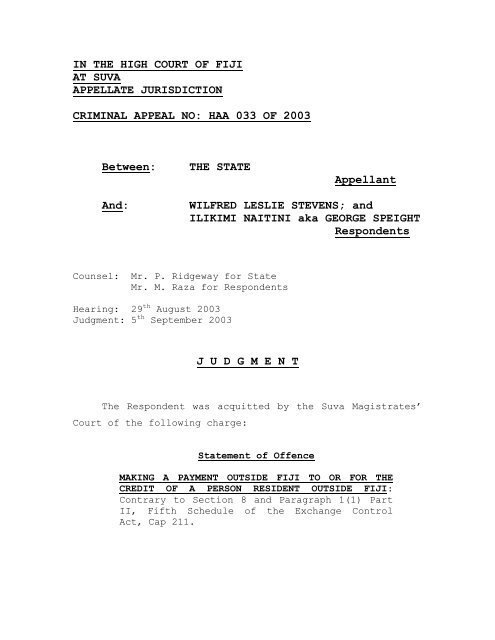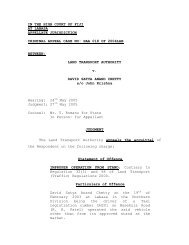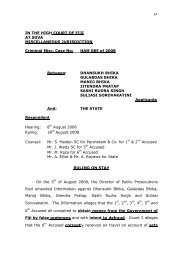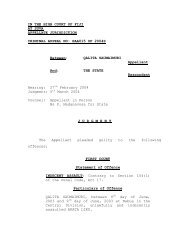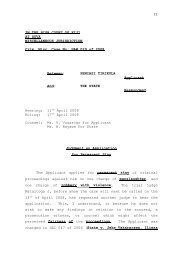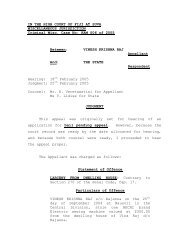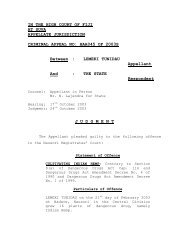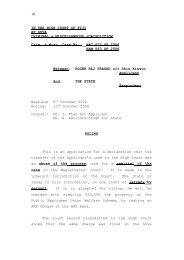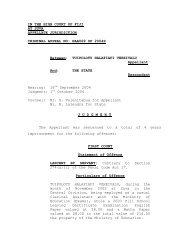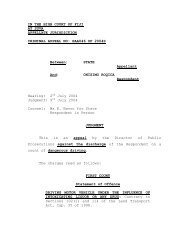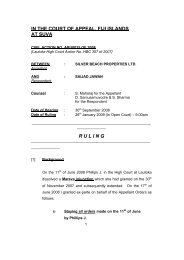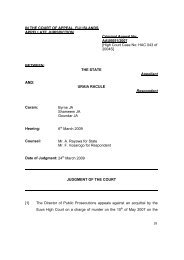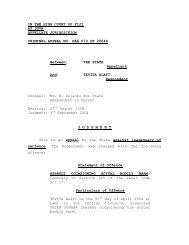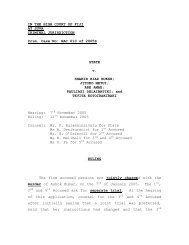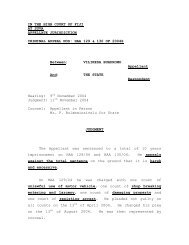Download State v Ilikimi Naitini aka George Speight and ... - Law Fiji
Download State v Ilikimi Naitini aka George Speight and ... - Law Fiji
Download State v Ilikimi Naitini aka George Speight and ... - Law Fiji
You also want an ePaper? Increase the reach of your titles
YUMPU automatically turns print PDFs into web optimized ePapers that Google loves.
IN THE HIGH COURT OF FIJI<br />
AT SUVA<br />
APPELLATE JURISDICTION<br />
CRIMINAL APPEAL NO: HAA 033 OF 2003<br />
Between:<br />
THE STATE<br />
Appellant<br />
And:<br />
WILFRED LESLIE STEVENS; <strong>and</strong><br />
ILIKIMI NAITINI <strong>aka</strong> GEORGE SPEIGHT<br />
Respondents<br />
Counsel: Mr. P. Ridgeway for <strong>State</strong><br />
Mr. M. Raza for Respondents<br />
Hearing: 29 th August 2003<br />
Judgment: 5 th September 2003<br />
J U D G M E N T<br />
The Respondent was acquitted by the Suva Magistrates’<br />
Court of the following charge:<br />
<strong>State</strong>ment of Offence<br />
MAKING A PAYMENT OUTSIDE FIJI TO OR FOR THE<br />
CREDIT OF A PERSON RESIDENT OUTSIDE FIJI:<br />
Contrary to Section 8 <strong>and</strong> Paragraph 1(1) Part<br />
II, Fifth Schedule of the Exchange Control<br />
Act, Cap 211.
2<br />
Particulars of Offence<br />
WILFRED LESLIE STEVENS did between 7 th <strong>and</strong> 21 st<br />
March 1995 being then a resident in <strong>Fiji</strong> make<br />
a payment of $21,000 outside <strong>Fiji</strong> to or for<br />
the credit of a person resident outside <strong>Fiji</strong>,<br />
namely the Wattle Group of companies in<br />
Australia, without obtaining the permission of<br />
the Reserve Bank of <strong>Fiji</strong>.<br />
At the trial in the Magistrates’ Court, there was an<br />
additional count against <strong>Ilikimi</strong> <strong>Naitini</strong>, a.k.a. <strong>George</strong><br />
<strong>Speight</strong> which read as follows:<br />
<strong>State</strong>ment of Offence<br />
MAKING A PAYMENT OUTSIDE FIJI TO OR FOR THE<br />
CREDIT OF A PERSON RESIDENT OUTSIDE FIJI:<br />
Contrary to Section 8 <strong>and</strong> Paragraph 1(1) Part<br />
II, Fifth Schedule of the Exchange Control<br />
Act, Cap 211 <strong>and</strong> Section 21 of the Penal Code,<br />
Cap 17.<br />
Particulars of Offence<br />
ILIKIMI NAITINI a.k.a. GEORGE SPEIGHT did<br />
between 7 th <strong>and</strong> 21 st March 1995 in <strong>Fiji</strong> aid <strong>and</strong><br />
abet the commission by Wilfred Leslie Stephens<br />
of the following offence, namely the making by<br />
the said Wilfred Leslie Stephens, a resident<br />
in <strong>Fiji</strong>, of a payment in an amount of $21,000<br />
outside <strong>Fiji</strong> to or for the credit of a person<br />
resident outside <strong>Fiji</strong>, namely the Wattle Group<br />
of companies in Australia, by arranging for<br />
remission of the said sum to the said group<br />
without obtaining the permission of the<br />
Reserve Bank of <strong>Fiji</strong>.<br />
To this count, the 2 nd accused pleaded guilty on the<br />
28 th of February 2002. The summary of facts read (to which<br />
the 2 nd accused agreed) as follows:
3<br />
“In 1995 a financial organisation based in<br />
Queensl<strong>and</strong>, Australia called the Wattle Group<br />
invited investments from the public not only<br />
from Australia but also from outside<br />
Australia. The Wattle Group was at all<br />
material times resident in Australia but not<br />
resident in <strong>Fiji</strong>, as was its parent company,<br />
Qantun Investment Pty. Limited. In <strong>Fiji</strong>, the<br />
Wattle Group was represented by the 2 nd<br />
accused, operating under the business name<br />
<strong>Speight</strong> <strong>and</strong> Associates. The 2 nd accused was at<br />
that time resident in Australia. <strong>Speight</strong> <strong>and</strong><br />
Associates was at all material times not<br />
resident in <strong>Fiji</strong>.<br />
2. In March 1995 the second accused was<br />
physically present in <strong>Fiji</strong>, while remaining a<br />
resident of Australia.<br />
3. Between 7 th <strong>and</strong> 21 st March 1995 the second<br />
accused was introduced to the first accused,<br />
who was a <strong>Fiji</strong> resident. The first accused,<br />
having decided at the request of the second<br />
accused to invest in the Wattle Group <strong>and</strong> the<br />
scheme of investment having been explained to<br />
him by the second accused, signed an agreement<br />
for investment of moneys by him in the Wattle<br />
Group <strong>and</strong> gave the second accused the sum of<br />
twenty one thous<strong>and</strong> <strong>Fiji</strong>an dollars (F$21,000)<br />
for the purpose of making such investment.<br />
4. The second accused, pursuant to his<br />
agreement with the accused, <strong>and</strong> acting on his<br />
behalf, invested the sum of F$21,000 on behalf<br />
of the first defendant in the Wattle Group in<br />
Australia.<br />
5. No exchange control approval was sought or<br />
given for the above transactions.”<br />
In mitigation the 2 nd accused said that he was<br />
assisting the 1 st accused, <strong>and</strong> that he did not know that<br />
Reserve Bank approval was needed. He was discharged<br />
without conviction.
4<br />
The trial in respect of the 1 st accused proceeded on<br />
the 30 th of April 2003. The former 2 nd accused gave evidence<br />
that on the 7 th of March 1995 he had signed an agreement<br />
with the 1 st accused, which he tendered. That agreement was<br />
that Geoffrey Robert Dexter, trading as “The Wattle Group”<br />
undertook to invest sums of money for the 1 st accused <strong>and</strong> to<br />
return to him between 5% to 7.5% of the principal amount<br />
every month. The 2 nd accused said that he invested $21,000<br />
of the 1 st accused’s money in the Wattle Group <strong>and</strong> confirmed<br />
the investment by letter of 21.5.95. That letter was also<br />
tendered. That letter reads:<br />
“Dear Mr. Stephens,<br />
Attached is the latest summary for your<br />
investment funds which were placed with the<br />
Wattle Group via <strong>George</strong> <strong>Speight</strong> & Assoc. as your<br />
Funds Manager. As you know your funds were<br />
taken personally by myself out of the country in<br />
the form of $21,000 <strong>Fiji</strong>an dollars <strong>and</strong> converted<br />
into Australian currency at an exchange rate of<br />
F$1.00 = AUS$0.94 giving a total of $19,530<br />
Australian dollars. This amount was placed as<br />
your investment on 21 March 1995 <strong>and</strong> has since<br />
earned a total of $1,950 in interest. Refer to<br />
the attached summary for the figures.”<br />
A further letter was tendered, dated 12 th July 1995,<br />
which read inter alia:<br />
“Dear Wilfred,<br />
Attached is the latest summary for your<br />
investment funds which were placed with the<br />
Wattle Group via <strong>George</strong> <strong>Speight</strong> & Associates as<br />
your Funds Manager ……………<br />
Yours sincerely,<br />
<strong>George</strong> <strong>Speight</strong>.”
5<br />
In examination-in-chief the 2 nd accused said that he<br />
had received the funds <strong>and</strong> invested it to the Wattle Group.<br />
However in cross-examination he said:<br />
“A.<br />
The $21,000 given to me by the accused<br />
remained in <strong>Fiji</strong>. While an equivalent<br />
amount from my account in Australia was<br />
paid to Wattle Group on the accused’s<br />
behalf ….<br />
A. The above is the truth.<br />
A. The money paid to me by the accused did<br />
not leave <strong>Fiji</strong>. I paid from my funds<br />
in Australia on an equivalent sum to<br />
Wattle Group on Accused’s behalf.”<br />
PW2, Rigamoto Motufaga a Reserve Bank Officer gave<br />
evidence that a $21,000 overseas transfer needed Reserve<br />
Bank approval <strong>and</strong> that in this case no such approval had<br />
been sought. In cross-examination he said – “Payment of<br />
$5000 that does not leave <strong>Fiji</strong> is not payment out of <strong>Fiji</strong>.”<br />
The Respondent’s caution interview was then tendered.<br />
In that interview the Respondent admitted giving the 2 nd<br />
accused $21,000 to invest with the Wattle Group. The<br />
following questions <strong>and</strong> answers are relevant:<br />
“Q18: At which place did you give him this<br />
money?<br />
A: At his room at the Travelodge.<br />
Q19: In which currency did you give him the<br />
money?<br />
A: <strong>Fiji</strong>an currency.
6<br />
Q20: Where did you get this $21,000 from?<br />
A: The money came from my son’s savings<br />
account NBF, CML Insurance early<br />
withdrawal, some of my savings too.<br />
(with all documents given to CID/SUVA).<br />
Q21: Did you have the information that he<br />
will take this money to Australia for<br />
investment?<br />
A: Yes. As he informed me that he was<br />
going to take it to Australia. I asked<br />
how. He told me that it was none of my<br />
business. I pointed out to him that I<br />
could apply to have it taken to<br />
Australia as I have nothing to hide as<br />
it was not black money. He again<br />
stress to me it was none of my<br />
business.<br />
Q22: Did you know that permission of Reserve<br />
Bank is required before any money is<br />
taken out of <strong>Fiji</strong>?<br />
A: Yes, that’s why I keep on asking him<br />
question of how he is taking the money<br />
after I have given him the money.<br />
Q23: Was permission taken from Reserve Bank<br />
before this $21,000.00 was taken out of<br />
<strong>Fiji</strong>? If not why?<br />
A: I don’t know as the money was in his<br />
h<strong>and</strong>s then <strong>and</strong> the contract sign.”<br />
Later in his interview the Respondent said that the<br />
money was later refunded to him because he was not<br />
satisfied with his investment. The interview was not<br />
disputed <strong>and</strong> there was no cross-examination about it.<br />
The defence made a submission of no case to answer,<br />
saying that the $21,000 had never left <strong>Fiji</strong>. The<br />
prosecution replied that the value or equivalent had been
7<br />
paid on the Respondent’s behalf in Australia <strong>and</strong> that this<br />
was sufficient to prove payment out of <strong>Fiji</strong>.<br />
The Court ruled that the prosecution had to show<br />
payment out of <strong>Fiji</strong> <strong>and</strong> that PW1 had said on oath that he<br />
had not paid the $21,000 to the Wattle Group but had spent<br />
it on his own personal use. The learned Magistrate then<br />
ruled:<br />
“In my view, this $21,000 given by the accused<br />
to PW1 was not paid outside of <strong>Fiji</strong>, by PW1,<br />
as m<strong>and</strong>ated by section 8 of the Exchange<br />
Control Act Chapter 211. In my view, the<br />
section has not been violated by the above<br />
transaction. Even PW2, the Manager of the<br />
Exchange <strong>and</strong> Control Unit of Reserve Bank<br />
stated in court today, that the above<br />
transaction is not “payment outside of <strong>Fiji</strong>”<br />
as required by section 8 above-mentioned.”<br />
The learned Magistrate then found that an essential<br />
ingredient of the charge was missing <strong>and</strong> acquitted the<br />
Respondent.<br />
The appeal<br />
The ground of appeal is as follows:<br />
“That the learned Magistrate erred in holding<br />
that an arrangement whereby a resident<br />
acquires an off-shore credit in exchange for<br />
providing an on-shore credit to a non-resident<br />
does not contravene Section 8 of the Exchange<br />
Control Act.”
8<br />
The petition asks that the finding of no case to<br />
answer should be set aside <strong>and</strong> the case remitted to the<br />
Magistrates’ Court for continuation of trial.<br />
The sole ground of appeal is therefore whether the<br />
transaction described by the first accused was a payment<br />
out of <strong>Fiji</strong>. Section 8 of the Exchange Control Act<br />
provides:<br />
“Except with the permission of the Minister,<br />
no person resident in <strong>Fiji</strong> shall, subject to<br />
the provisions of this section make any<br />
payment outside <strong>Fiji</strong> to or for the credit of<br />
any person resident outside <strong>Fiji</strong>.”<br />
The facts are not materially in dispute, although it<br />
is apparent that PW1 (the 2 nd accused) introduced the story<br />
of keeping the original $21,000 in <strong>Fiji</strong> <strong>and</strong> simply making a<br />
transfer from his account in Australia to the Wattle Group,<br />
for the first time in cross-examination. He made no<br />
mention of it in the two letters he wrote the Respondent,<br />
nor did he tell the court this version of the “transfer” on<br />
his own plea of guilty, nor did he mention it in<br />
examination-in-chief. So surprising is this version of the<br />
facts, that the learned Magistrate might with good cause,<br />
have decided not to accept it, preferring instead the more<br />
consistent account in the letters <strong>and</strong> examination-in-chief.<br />
There was certainly sufficient evidence as to the<br />
Respondent’s own intention to transfer the money abroad in<br />
his caution interview. Although section 8 of the Exchange<br />
Control Act creates an offence of strict liability, the<br />
caution interview’s contents are helpful to establish that<br />
the Respondent firstly, wanted to transfer the money abroad
9<br />
<strong>and</strong> secondly, knew he was required to obtain Reserve Bank<br />
approval for such transfer.<br />
However, the learned Magistrate did not refer to the<br />
compelling evidence of the interview, or to the letters<br />
tendered by PW1 (the 2 nd accused). Instead he appears to<br />
have accepted the evidence of PW1 in cross-examination <strong>and</strong><br />
found (in error) that this was not a transfer abroad<br />
according to the evidence of PW2. He erred in three ways,<br />
in this regard.<br />
Firstly, this was a submission of no case to answer.<br />
It is now trite law that the court must ask itself (in the<br />
magistrates’ court) whether on the uncontradicted evidence<br />
of the prosecution a reasonable tribunal might convict.<br />
This was not the appropriate time to accept one version of<br />
the facts over another. There were two versions of the<br />
facts before the court, <strong>and</strong> it should have asked itself<br />
whether a conviction was possible on either version.<br />
Clearly the version available on the documents tendered<br />
showed that the funds were taken out of the country by PW1.<br />
Taken with PW1’s plea of guilty to the section 8 offence,<br />
there was a clear prima facie case that the Respondent who<br />
was resident in <strong>Fiji</strong> <strong>and</strong> made a payment outside <strong>Fiji</strong> to the<br />
Wattle Group of Companies through the agency of the 2 nd<br />
accused. That was the first error.<br />
The second error was that he found that a payment can<br />
only be made if the same money h<strong>and</strong>ed to an agent in <strong>Fiji</strong>,<br />
finds its way to the person resident abroad. As <strong>State</strong><br />
counsel submitted, such a finding would render section 8 of<br />
the Exchange Control Act meaningless because financial
10<br />
business is never done in that way. If a person in <strong>Fiji</strong>,<br />
pays a bank in <strong>Fiji</strong> a sum in excess of $5000, <strong>and</strong> asks for<br />
the money to be credited to the account of a person in<br />
Australia, the bank will tell him or her that the<br />
transaction will be done by telegraphic transfer <strong>and</strong> that<br />
Reserve Bank approval is required. The scope of the<br />
section is not limited to those persons who physically<br />
smuggle money out of the country by stuffing bank notes<br />
into their suitcases. It applies to all persons <strong>and</strong><br />
agencies who are able to transfer funds by electronic<br />
device. In the case of the latter, the money physically<br />
does not leave the country, the same or equivalent amount<br />
is simply transferred from the agency abroad to the<br />
recipient abroad. This is precisely what PW1 said he did<br />
(in cross-examination). Even on this version of the facts,<br />
a prima facie case was made out.<br />
Lastly, the learned Magistrate appears to have erred<br />
in finding support for PW1’s later version of the facts in<br />
the evidence of PW2. In cross-examination (although<br />
counsel for the Respondent told me from the bar table that<br />
he did not ask the question, the learned magistrate had<br />
asked it), PW2 said:<br />
“Payment of $5000 that does not leave <strong>Fiji</strong> is<br />
not payment out of <strong>Fiji</strong>.”<br />
I do not read this statement as a declaration that the<br />
$21,000 in this case did not leave <strong>Fiji</strong>. It appears (<strong>and</strong><br />
it is not clear) that the witness was asked whether, if<br />
money in excess of $5000 did not leave <strong>Fiji</strong>, it was a<br />
payment out of <strong>Fiji</strong> for the purposes of section 8 of the
11<br />
Exchange Control Act. His answer was, quite rightly, that<br />
if payment is not made out of <strong>Fiji</strong>, the money has not left<br />
the country. That statement has limited relevance to this<br />
case. On PW1’s cross-examination version, he effected the<br />
transfer of the equivalent amount to the Wattle Group in<br />
Australia. The facts were that the payment was made out of<br />
<strong>Fiji</strong> in a way which is no different from the way in which<br />
payments are made out of <strong>Fiji</strong> by banks daily. Indeed, PW2<br />
appears to have explained the telegraphic transfer<br />
procedure in re-examination.<br />
Clearly the finding that there was no prima facie case<br />
cannot st<strong>and</strong>. It is quashed, as is the acquittal.<br />
Result<br />
The order for acquittal is set aside <strong>and</strong> substituted<br />
with a finding that there was a case for the Respondent to<br />
answer. The case is remitted to the same Magistrate to<br />
continue with the hearing.<br />
…………………………………………………………<br />
Nazhat Shameem<br />
JUDGE<br />
At Suva<br />
5 th September 2003


